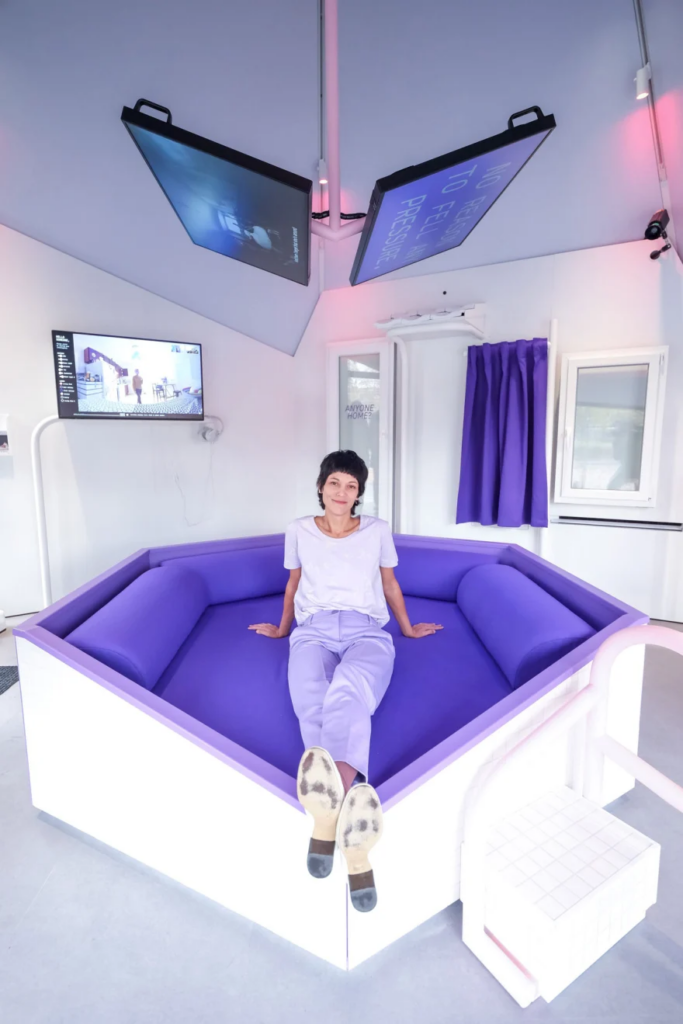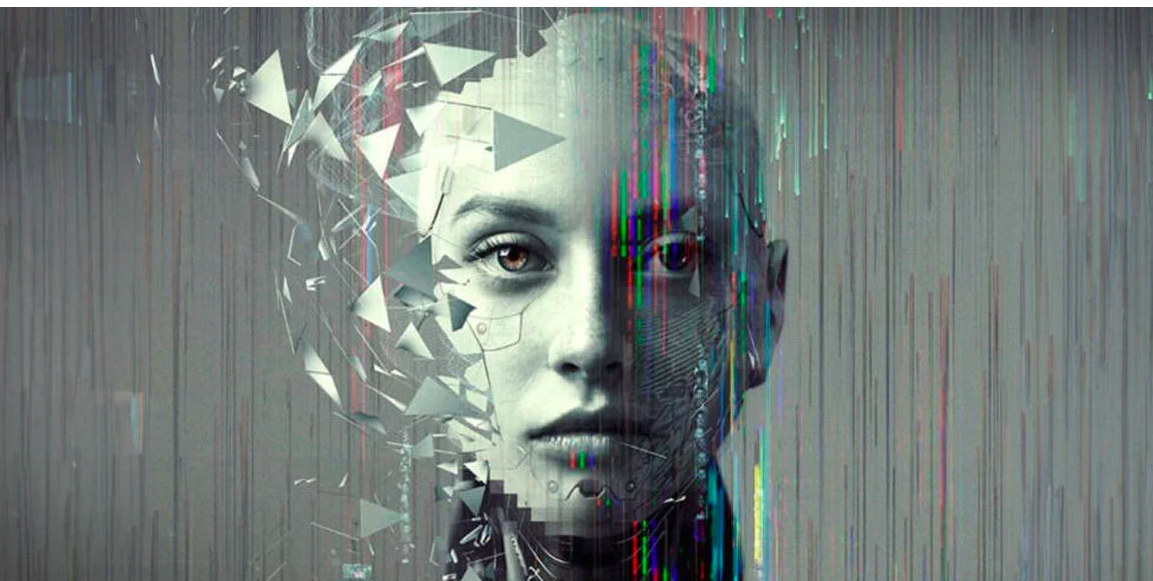Artificial Intelligence is no longer a mere science fiction scenario – it’s here, and it’s transforming the world around us. How is it affecting our daily lives? What role does it play in art and cinema? Where does human creativity end and the algorithm begin? The tribute AI: An Inevitable Intelligence at the 27th Thessaloniki Documentary Film Festival (March 6–16, 2025) invites audiences on an exciting journey, showcasing a selection of revealing documentaries, an impressive art installation, a masterclass, a special edition, and the Proton Plano magazine, which will this year experiment with AI co-creation. It’s a cinematic exploration of a new reality, blurring the boundaries between human and digital.
The Films:
The tribute will feature films exploring various facets of Artificial Intelligence. Among them is The Hexagonal Hive and a Mouse in a Maze by Tilda Swinton, an exciting journey into the mechanics of learning and how it’s influenced by technology. The Biography of a Software by Giorgos Drivas, the first medium-length Greek film entirely made by AI, will also be screened. The festival will also feature About a Hero, an adaptation of a screenplay written by an AI that studied the work of Werner Herzog.

Art Installation:
At the 27th Thessaloniki Documentary Film Festival, COSMOTE, a member of the TELEKOM group, presents a unique experience combining art and AI technology. The installation LAUREN: Anyone Home? by artist and UCLA professor Lauren Lee McCarthy will be showcased at MOMus–Experimental Center for the Arts (Pier A, Thessaloniki Port).
Masterclass:
On Sunday, March 9, at 12:00 in the Pavlos Zannis Hall, a masterclass titled AI and ART EXPERIENCE powered by TELEKOM will explore “The Impact of Artificial Intelligence on Art.” The panel will feature actress Stefania Goulioti, visual artist and director Giorgos Drivas, philosopher and founder of the Institute of Philosophy and Technology Giannis Stamatellos, songwriter Kostis Maravegias, and artist and UCLA professor Lauren Lee McCarthy. They will discuss the possibilities and challenges presented by AI in art, offering insight into the future of creative expression.

Festival Publications:
The special edition of the festival dedicated to AI will include texts by academics, artists, journalists, and technology experts, examining issues arising from the evolution and widespread use of AI in recent years. Additionally, Proton Plano will be entirely dedicated to AI, emerging from an extensive dialogue with the technology itself.
Art Installation:
In LAUREN, the artist, acting like an Alexa device, observes and controls the home of the visitors. The experience begins with the installation of smart devices such as cameras, microphones, locks, faucets, and household appliances, turning the space into a fully connected smart home. Unlike typical smart home technologies, LAUREN focuses on human presence, giving simple algorithms understanding and intuition. It functions as a human-centered digital assistant, balancing intimacy with privacy, convenience with autonomy, while highlighting the role of human labor in an increasingly automated world. Through this experience, LAUREN invites the audience to reflect on their relationship with technology and the control it exerts over their personal space, offering a different perspective on what “smart” technology can truly mean. The work raises questions on how AI can spark a meaningful dialogue.

The work won the Human AI Art Award, a joint initiative by TELEKOM and the Bonn Museum of Modern Art. The award recognizes how AI is changing our perception of creativity and technology, supporting projects that combine art with AI to influence and transform how technology is used and perceived today. McCarthy’s work embodies the mission of the award, as it critically approaches AI and reimagines how humanity, nature, and technology can coexist.
LAUREN: Anyone Home?
Medium: Performance Installation
Artist: Lauren Lee McCarthy, 2024
Curator: Christianna Kazakou
Installation Design in collaboration with Ben Evans James
Studio Assistant: Wylie Kasai
Opening: Saturday, March 8
Duration: March 8–16
The Films in the Tribute:
About a Hero (2024) by Piotr Winiewicz: When a worker dies under mysterious circumstances, narrator Werner Herzog travels to Getukirchenburg to investigate. However, it is revealed that neither Herzog nor the film is quite what they seem. About a Hero is an adaptation of a screenplay written by an AI trained on the works of the famous director. The narrative is deeply self-referential and features interviews with artists, philosophers, and scientists, exploring concepts of authenticity, immortality, and the soul in the age of AI.
Flash Wars: Autonomous Weapons, AI, and the Future of Warfare (2024) by Daniel Andrew Wunderer: This documentary shows how AI handles “kamikaze” drones and robotic dogs patrolling the streets of New York. Science fiction has become reality, as experts discuss how AI has radically changed modern warfare, warning of the potential dangers. The film explores the philosophical, legal, ethical, and material implications of machines capable of inflicting death, offering a new perspective on global conflict.
In the Belly of AI (2024) by Henri Poulain: This film explores how AI feeds our dreams and nightmares. While tech giants promise to create a new humanity, AI remains hidden behind the scenes. Meanwhile, millions of workers around the world prepare vast amounts of data that fuel the insatiable algorithms, risking their mental health and family structures. A chilling documentary about the largest exploitation of people and places in the 21st century, diving into the new digital revolution and its impact on people and the environment.

The Biography of a Software (2024) by Giorgos Drivas: What happens when someone who has forgotten everything attempts to use a computer to recall their past life? What if this person hasn’t forgotten anything at all, and doesn’t even react like a human? This multimedia project by Giorgos Drivas, in collaboration with composer Melina Paxinou, explores the evolution of AI programs through moving images, photography, and music. It presents a conversation with an intelligent software that retrieves digital audiovisual data from the past to reactivate the memory of a person searching for their lost identity.
The Hexagonal Hive and a Mouse in a Maze (2024) by Bartek Jiantos and Tilda Swinton: What is intelligence, and when does it become artificial? Can robots dance? Can they help children grow? This film explores learning mechanisms and takes viewers deep into the heart of a supercomputer, a chalkboard, and the process of weaving a basket. It pushes us to question how the human mind can initiate change for our species.
iHuman (2019) by Tonje Hessen Schei: A political thriller about AI, power, and social control, iHuman penetrates the world of AI, revealing how the most powerful technology of our time is changing our lives, society, and future. The film follows the pioneers of this invisible technological revolution, examining the ways it develops and imposes itself, and questioning where it will take us. Will AI be a lever for progress, guided by the common good, or will it lead to a dystopian society of total control?

Short Films:
The festival collaborates with OpenDocs, a groundbreaking global initiative that provides support, funding, AI tools, and consulting to filmmakers worldwide. This initiative, created by Anna Giralt Gris and Jorge Caballero, aims to help filmmakers integrate AI tools into storytelling. Five films chosen through OpenDocs will be presented at the Thessaloniki Documentary Film Festival:
512×512 (2023) by Artur Sopán: Using AI technology, an internet user attempts to reconstruct the face of Francine Descartes, the young daughter of French philosopher René Descartes, based on the myth that Descartes created a robot with her face after her death.
KinkTimacy (2025) by Quang Nat Nong: A deep dive into the Japanese sadomasochistic practice of Shibari, following a Cambodian migrant in Australia, introducing people seeking the transformative properties of fetishism.
Saigon, Kosovo (2025) by Tin Dirdamal: A mysterious narrative using images produced by the Runway AI program, telling the story of a woman who wakes up speaking fluent Vietnamese after an accident in Kosovo, and an American soldier in Vietnam who forgets English after a head injury.

The Rock Speaks (2025) by François Knëtché and Amy Louise Wilson: The journey of a piece of cobalt across continents, from Congo to the global production chain. A hybrid documentary using AI to visualize mining areas of this rare mineral.
Their Eyes (2025) by Nicolas Gourault: A film about people processing countless images of road movement in the US, training future self-driving cars. They also express their fear of being replaced by the software they help train.

Special Edition and Proton Plano
The festival is preparing a bilingual special edition featuring texts from distinguished journalists, academics, artists, and technology experts, which will explore issues related to artificial intelligence, its evolution, and its relationship with cinema. The edition will include contributions from Giorgos Chatzivasileiou (journalist, author, and documentary filmmaker), Giorgos Drivas (director and multimedia artist), and Anna Giralt Gris and Jorge Caballero (founders of Artefacto, a production company specializing in new technologies).
Ask me anything
Explore related questions





